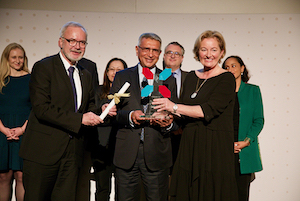By Sophie Theis, published by Women’s World Banking, November 2019, 18 pages, available at https://www.womensworldbanking.org/insights-and-impact/women-social-commerce-entrepreneurs-in-india-and-indonesia/
Female entrepreneurs in India and Indonesia historically have faced a multitude of challenges such as “low access to capital, restricted mobility, limitations on property rights, time poverty and gender norms.” In both countries, women own less than



 Pausch: Climate change is the biggest issue we face as a society today. At the mitigation level, action is slowly (too slowly) being taken to reduce global emissions. However, a sensible response must include adaptation too. How do we live – and more importantly, help the most vulnerable to survive – in a world with a very different climate than we’ve been used to?
Pausch: Climate change is the biggest issue we face as a society today. At the mitigation level, action is slowly (too slowly) being taken to reduce global emissions. However, a sensible response must include adaptation too. How do we live – and more importantly, help the most vulnerable to survive – in a world with a very different climate than we’ve been used to?